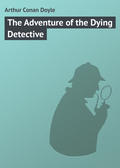
Артур Конан Дойл
Round the Fire Stories
“What shall I do, then?”
“I will tell you. Would you mind following me this way?” He led me out of the dining-room and down a long passage until we came to a terminal door. Inside there was a large bare room fitted as a laboratory, with numerous scientific instruments and bottles. A shelf ran along one side, upon which there stood a long line of glass jars containing pathological and anatomical specimens.
“You see that I still dabble in some of my old studies,” said Sir Dominick. “These jars are the remains of what was once a most excellent collection, but unfortunately I lost the greater part of them when my house was burned down in Bombay in ‘92. It was a most unfortunate affair for me – in more ways than one. I had examples of many rare conditions, and my splenic collection was probably unique. These are the survivors.”
I glanced over them, and saw that they really were of a very great value and rarity from a pathological point of view: bloated organs, gaping cysts, distorted bones, odious parasites – a singular exhibition of the products of India.
“There is, as you see, a small settee here,” said my host. “It was far from our intention to offer a guest so meagre an accommodation, but since affairs have taken this turn, it would be a great kindness upon your part if you would consent to spend the night in this apartment. I beg that you will not hesitate to let me know if the idea should be at all repugnant to you.”
“On the contrary,” I said, “it is most acceptable.”
“My own room is the second on the left, so that if you should feel that you are in need of company a call would always bring me to your side.”
“I trust that I shall not be compelled to disturb you.”
“It is unlikely that I shall be asleep. I do not sleep much. Do not hesitate to summon me.”
And so with this agreement we joined Lady Holden in the drawing-room and talked of lighter things.
It was no affectation upon my part to say that the prospect of my night’s adventure was an agreeable one. I have no pretence to greater physical courage than my neighbours, but familiarity with a subject robs it of those vague and undefined terrors which are the most appalling to the imaginative mind. The human brain is capable of only one strong emotion at a time, and if it be filled with curiosity or scientific enthusiasm, there is no room for fear. It is true that I had my uncle’s assurance that he had himself originally taken this point of view, but I reflected that the breakdown of his nervous system might be due to his forty years in India as much as to any psychical experiences which had befallen him. I at least was sound in nerve and brain, and it was with something of the pleasurable thrill of anticipation with which the sportsman takes his position beside the haunt of his game that I shut the laboratory door behind me, and partially undressing, lay down upon the rug-covered settee.
It was not an ideal atmosphere for a bedroom. The air was heavy with many chemical odours, that of methylated spirit predominating. Nor were the decorations of my chamber very sedative. The odious line of glass jars with their relics of disease and suffering stretched in front of my very eyes. There was no blind to the window, and a three-quarter moon streamed its white light into the room, tracing a silver square with filigree lattices upon the opposite wall. When I had extinguished my candle this one bright patch in the midst of the general gloom had certainly an eerie and discomposing aspect. A rigid and absolute silence reigned throughout the old house, so that the low swish of the branches in the garden came softly and soothingly to my ears. It may have been the hypnotic lullaby of this gentle susurrus, or it may have been the result of my tiring day, but after many dozings and many efforts to regain my clearness of perception, I fell at last into a deep and dreamless sleep.
I was awakened by some sound in the room, and I instantly raised myself upon my elbow on the couch. Some hours had passed, for the square patch upon the wall had slid downwards and sideways until it lay obliquely at the end of my bed. The rest of the room was in deep shadow. At first I could see nothing, presently, as my eyes became accustomed to the faint light, I was aware, with a thrill which all my scientific absorption could not entirely prevent, that something was moving slowly along the line of the wall. A gentle, shuffling sound, as of soft slippers, came to my ears, and I dimly discerned a human figure walking stealthily from the direction of the door. As it emerged into the patch of moonlight I saw very clearly what it was and how it was employed. It was a man, short and squat, dressed in some sort of dark-grey gown, which hung straight from his shoulders to his feet. The moon shone upon the side of his face, and I saw that it was chocolate-brown in colour, with a ball of black hair like a woman’s at the back of his head. He walked slowly, and his eyes were cast upwards towards the line of bottles which contained those gruesome remnants of humanity. He seemed to examine each jar with attention, and then to pass on to the next. When he had come to the end of the line, immediately opposite my bed, he stopped, faced me, threw up his hands with a gesture of despair, and vanished from my sight.
I have said that he threw up his hands, but I should have said his arms, for as he assumed that attitude of despair I observed a singular peculiarity about his appearance. He had only one hand! As the sleeves drooped down from the upflung arms I saw the left plainly, but the right ended in a knobby and unsightly stump. In every other way his appearance was so natural, and I had both seen and heard him so clearly, that I could easily have believed that he was an Indian servant of Sir Dominick’s who had come into my room in search of something. It was only his sudden disappearance which suggested anything more sinister to me. As it was I sprang from my couch, lit a candle, and examined the whole room carefully. There were no signs of my visitor, and I was forced to conclude that there had really been something outside the normal laws of Nature in his appearance. I lay awake for the remainder of the night, but nothing else occurred to disturb me.
I am an early riser, but my uncle was an even earlier one, for I found him pacing up and down the lawn at the side of the house. He ran towards me in his eagerness when he saw me come out from the door.
“Well, well!” he cried. “Did you see him?”
“An Indian with one hand?”
“Precisely.”
“Yes, I saw him” – and I told him all that occurred. When I had finished, he led the way into his study.
“We have a little time before breakfast,” said he. “It will suffice to give you an explanation of this extraordinary affair – so far as I can explain that which is essentially inexplicable. In the first place, when I tell you that for four years I have never passed one single night, either in Bombay, aboard ship, or here in England without my sleep being broken by this fellow, you will understand why it is that I am a wreck of my former self. His programme is always the same. He appears by my bedside, shakes me roughly by the shoulder, passes from my room into the laboratory, walks slowly along the line of my bottles, and then vanishes. For more than a thousand times he has gone through the same routine.”
“What does he want?”
“He wants his hand.”
“His hand?”
“Yes, it came about in this way. I was summoned to Peshawur for a consultation some ten years ago, and while there I was asked to look at the hand of a native who was passing through with an Afghan caravan. The fellow came from some mountain tribe living away at the back of beyond somewhere on the other side of Kaffiristan. He talked a bastard Pushtoo, and it was all I could do to understand him. He was suffering from a soft sarcomatous swelling of one of the metacarpal joints, and I made him realize that it was only by losing his hand that he could hope to save his life. After much persuasion he consented to the operation, and he asked me, when it was over, what fee I demanded. The poor fellow was almost a beggar, so that the idea of a fee was absurd, but I answered in jest that my fee should be his hand, and that I proposed to add it to my pathological collection.
“To my surprise he demurred very much to the suggestion, and he explained that according to his religion it was an all-important matter that the body should be reunited after death, and so make a perfect dwelling for the spirit. The belief is, of course, an old one, and the mummies of the Egyptians arose from an analogous superstition. I answered him that his hand was already off, and asked him how he intended to preserve it. He replied that he would pickle it in salt and carry it about with him. I suggested that it might be safer in my keeping than in his, and that I had better means than salt for preserving it. On realizing that I really intended to carefully keep it, his opposition vanished instantly. ‘But remember, sahib,’ said he, ‘I shall want it back when I am dead.’ I laughed at the remark, and so the matter ended. I returned to my practice, and he no doubt in the course of time was able to continue his journey to Afghanistan.
“Well, as I told you last night, I had a bad fire in my house at Bombay. Half of it was burned down, and, among other things, my pathological collection was largely destroyed. What you see are the poor remains of it. The hand of the hillman went with the rest, but I gave the matter no particular thought at the time. That was six years ago.
“Four years ago – two years after the fire – I was awakened one night by a furious tugging at my sleeve. I sat up under the impression that my favourite mastiff was trying to arouse me. Instead of this, I saw my Indian patient of long ago, dressed in the long grey gown which was the badge of his people. He was holding up his stump and looking reproachfully at me. He then went over to my bottles, which at that time I kept in my room, and he examined them carefully, after which he gave a gesture of anger and vanished. I realized that he had just died, and that he had come to claim my promise that I should keep his limb in safety for him.
“Well, there you have it all, Dr. Hardacre. Every night at the same hour for four years this performance has been repeated. It is a simple thing in itself, but it has worn me out like water dropping on a stone. It has brought a vile insomnia with it, for I cannot sleep now for the expectation of his coming. It has poisoned my old age and that of my wife, who has been the sharer in this great trouble. But there is the breakfast gong, and she will be waiting impatiently to know how it fared with you last night. We are both much indebted to you for your gallantry, for it takes something from the weight of our misfortune when we share it, even for a single night, with a friend, and it reassures us as to our sanity, which we are sometimes driven to question.”
This was the curious narrative which Sir Dominick confided to me – a story which to many would have appeared to be a grotesque impossibility, but which, after my experience of the night before, and my previous knowledge of such things, I was prepared to accept as an absolute fact. I thought deeply over the matter, and brought the whole range of my reading and experience to bear upon it. After breakfast, I surprised my host and hostess by announcing that I was returning to London by the next train.
“My dear doctor,” cried Sir Dominick in great distress, “you make me feel that I have been guilty of a gross breach of hospitality in intruding this unfortunate matter upon you. I should have borne my own burden.”
“It is, indeed, that matter which is taking me to London,” I answered; “but you are mistaken, I assure you, if you think that my experience of last night was an unpleasant one to me. On the contrary, I am about to ask your permission to return in the evening and spend one more night in your laboratory. I am very eager to see this visitor once again.”
My uncle was exceedingly anxious to know what I was about to do, but my fears of raising false hopes prevented me from telling him. I was back in my own consulting-room a little after luncheon, and was confirming my memory of a passage in a recent book upon occultism which had arrested my attention when I read it.
“In the case of earth-bound spirits,” said my authority, “some one dominant idea obsessing them at the hour of death is sufficient to hold them to this material world. They are the amphibia of this life and of the next, capable of passing from one to the other as the turtle passes from land to water. The causes which may bind a soul so strongly to a life which its body has abandoned are any violent emotion. Avarice, revenge, anxiety, love, and pity have all been known to have this effect. As a rule it springs from some unfulfilled wish, and when the wish has been fulfilled the material bond relaxes. There are many cases upon record which show the singular persistence of these visitors, and also their disappearance when their wishes have been fulfilled, or in some cases when a reasonable compromise has been effected.”
“A reasonable compromise effected” – those were the words which I had brooded over all the morning, and which I now verified in the original. No actual atonement could be made here – but a reasonable compromise! I made my way as fast as a train could take me to the Shadwell Seamen’s Hospital, where my old friend Jack Hewett was house-surgeon. Without explaining the situation I made him understand exactly what it was that I wanted.
“A brown man’s hand!” said he, in amazement. “What in the world do you want that for?”
“Never mind. I’ll tell you some day. I know that your wards are full of Indians.”
“I should think so. But a hand – ” He thought a little and then struck a bell.
“Travers,” said he to a student-dresser, “what became of the hands of the Lascar which we took off yesterday? I mean the fellow from the East India Dock who got caught in the steam winch.”
“They are in the post-mortem room, sir.”
“Just pack one of them in antiseptics and give it to Dr. Hardacre.”
And so I found myself back at Rodenhurst before dinner with this curious outcome of my day in town. I still said nothing to Sir Dominick, but I slept that night in the laboratory, and I placed the Lascar’s hand in one of the glass jars at the end of my couch.
So interested was I in the result of my experiment that sleep was out of the question. I sat with a shaded lamp beside me and waited patiently for my visitor. This time I saw him clearly from the first. He appeared beside the door, nebulous for an instant, and then hardening into as distinct an outline as any living man. The slippers beneath his grey gown were red and heelless, which accounted for the low, shuffling sound which he made as he walked. As on the previous night he passed slowly along the line of bottles until he paused before that which contained the hand. He reached up to it, his whole figure quivering with expectation, took it down, examined it eagerly, and then, with a face which was convulsed with fury and disappointment, he hurled it down on the floor. There was a crash which resounded through the house, and when I looked up the mutilated Indian had disappeared. A moment later my door flew open and Sir Dominick rushed in.
“You are not hurt?” he cried.
“No – but deeply disappointed.”
He looked in astonishment at the splinters of glass, and the brown hand lying upon the floor.
“Good God!” he cried. “What is this?”
I told him my idea and its wretched sequel. He listened intently, but shook his head.
“It was well thought of,” said he, “but I fear that there is no such easy end to my sufferings. But one thing I now insist upon. It is that you shall never again upon any pretext occupy this room. My fears that something might have happened to you – when I heard that crash – have been the most acute of all the agonies which I have undergone. I will not expose myself to a repetition of it.”
He allowed me, however, to spend the remainder of that night where I was, and I lay there worrying over the problem and lamenting my own failure. With the first light of morning there was the Lascar’s hand still lying upon the floor to remind me of my fiasco. I lay looking at it – and as I lay suddenly an idea flew like a bullet through my head and brought me quivering with excitement out of my couch. I raised the grim relic from where it had fallen. Yes, it was indeed so. The hand was the left hand of the Lascar.
By the first train I was on my way to town, and hurried at once to the Seamen’s Hospital. I remembered that both hands of the Lascar had been amputated, but I was terrified lest the precious organ which I was in search of might have been already consumed in the crematory. My suspense was soon ended. It had still been preserved in the post-mortem room. And so I returned to Rodenhurst in the evening with my mission accomplished and the material for a fresh experiment.
But Sir Dominick Holden would not hear of my occupying the laboratory again. To all my entreaties he turned a deaf ear. It offended his sense of hospitality, and he could no longer permit it. I left the hand, therefore, as I had done its fellow the night before, and I occupied a comfortable bedroom in another portion of the house, some distance from the scene of my adventures.
But in spite of that my sleep was not destined to be uninterrupted. In the dead of night my host burst into my room, a lamp in his hand. His huge gaunt figure was enveloped in a loose dressing-gown, and his whole appearance might certainly have seemed more formidable to a weak-nerved man than that of the Indian of the night before. But it was not his entrance so much as his expression which amazed me. He had turned suddenly younger by twenty years at the least. His eyes were shining, his features radiant, and he waved one hand in triumph over his head. I sat up astounded, staring sleepily at this extraordinary visitor. But his words soon drove the sleep from my eyes.
“We have done it! We have succeeded!” he shouted. “My dear Hardacre, how can I ever in this world repay you?”
“You don’t mean to say that it is all right?”
“Indeed I do. I was sure that you would not mind being awakened to hear such blessed news.”
“Mind! I should think not indeed. But is it really certain?”
“I have no doubt whatever upon the point. I owe you such a debt, my dear nephew, as I have never owed a man before, and never expected to. What can I possibly do for you that is commensurate? Providence must have sent you to my rescue. You have saved both my reason and my life, for another six months of this must have seen me either in a cell or a coffin. And my wife – it was wearing her out before my eyes. Never could I have believed that any human being could have lifted this burden off me.” He seized my hand and wrung it in his bony grip.
“It was only an experiment – a forlorn hope – but I am delighted from my heart that it has succeeded. But how do you know that it is all right? Have you seen something?”
He seated himself at the foot of my bed.
“I have seen enough,” said he. “It satisfies me that I shall be troubled no more. What has passed is easily told. You know that at a certain hour this creature always comes to me. To-night he arrived at the usual time, and aroused me with even more violence than is his custom. I can only surmise that his disappointment of last night increased the bitterness of his anger against me. He looked angrily at me, and then went on his usual round. But in a few minutes I saw him, for the first time since this persecution began, return to my chamber. He was smiling. I saw the gleam of his white teeth through the dim light. He stood facing me at the end of my bed, and three times he made the low Eastern salaam which is their solemn leave-taking. And the third time that he bowed he raised his arms over his head, and I saw his two hands outstretched in the air. So he vanished, and, as I believe, for ever.”
So that is the curious experience which won me the affection and the gratitude of my celebrated uncle, the famous Indian surgeon. His anticipations were realized, and never again was he disturbed by the visits of the restless hillman in search of his lost member. Sir Dominick and Lady Holden spent a very happy old age, unclouded, so far as I know, by any trouble, and they finally died during the great influenza epidemic within a few weeks of each other. In his lifetime he always turned to me for advice in everything which concerned that English life of which he knew so little; and I aided him also in the purchase and development of his estates. It was no great surprise to me, therefore, that I found myself eventually promoted over the heads of five exasperated cousins, and changed in a single day from a hard-working country doctor into the head of an important Wiltshire family. I at least have reason to bless the memory of the man with the brown hand, and the day when I was fortunate enough to relieve Rodenhurst of his unwelcome presence.







